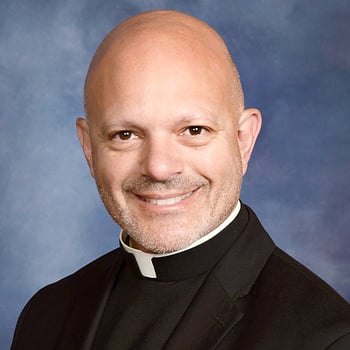Fr. Lavastida: Bartimaeus reminds us to cultivate our spiritual sight
-
 Kids’ Clarion asked Father José I. Lavastida, pastor of Blessed Francis Seelos Church in New Orleans, to look ahead to the Gospel for Oct. 24, the 30th Sunday in Ordinary Time. The Gospel is printed below, and Father Lavastida’s reflection follows.
Kids’ Clarion asked Father José I. Lavastida, pastor of Blessed Francis Seelos Church in New Orleans, to look ahead to the Gospel for Oct. 24, the 30th Sunday in Ordinary Time. The Gospel is printed below, and Father Lavastida’s reflection follows.
As Jesus was leaving Jericho with his disciples and a sizable crowd, Bartimaeus, a blind man, the son of Timaeus, sat by the roadside begging. On hearing that it was Jesus of Nazareth, he began to cry out and say, “Jesus, son of David, have pity on me.” And many rebuked him, telling him to be silent. But he kept calling out all the more, “Son of David, have pity on me.” Jesus stopped and said, “Call him.” So they called the blind man, saying to him, “Take courage; get up, Jesus is calling you.” He threw aside his cloak, sprang up, and came to Jesus. Jesus said to him in reply, “What do you want me to do for you?” The blind man replied to him, “Master, I want to see.” Jesus told him, “Go your way; your faith has saved you.” Immediately he received his sight and followed him on the way. – Mark 10: 46-52
By Fr. José I. Lavastida
Guest columnist
Dear Children,
The man named Bartimaeus in the Gospel that will be proclaimed at Mass this weekend is a good reminder to us of how important our sight is.
We rely daily on the ability to see. For athletes, there is an important notion related to sight that is called peripheral vision. That is the ability to see not only what is in front of you, but also a fuller picture that allows you to see what is on the sides.
Let me give you an example: If you stretch out your arms in the form of a cross, and you pay attention to what you see, you will realize that when your arms are stretched way behind your body, you cannot see your hands. But as you begin to bring them closer forward, there is a point when you begin to see your hands, even if you are looking straight ahead. That is peripheral vision!
I am sure you all know who Drew Brees is, the great future Hall of Fame quarterback of the Saints. When he played football for our city and team, he had great peripheral vision which helped him – not to show who he was going to throw the football to – but to be able to see receivers running on either side without giving away where he was going to complete a pass. In other words, he did not need to photograph his pass because peripheral vision allowed him to see receivers who were not directly in his vision lane.
My dear children and children at heart, more important than physical sight, Bartimaeus reminds us that we need to develop our spiritual sight! By calling on Jesus with great faith, and asking him to restore his sight, Bartimaeus reminds us that we have our own “blindness” that we need healed so that we can get closer to God and his son, Jesus.
Such “blindness” for us can be caused by our faults and sins and the things we need to get better at.
I encourage all of you to think today of your spiritual sight. When you take time to pray daily, take time every Sunday to go to Mass and go at least every month to the sacrament of penance (also known as confession), you are asking God to give you the gift of spiritual sight.
And don’t worry, because Jesus always sees you when you call on him. Jesus has great peripheral vision! Be like Bartimaeus, and don’t let anyone discourage you from calling out to Jesus!
Enjoy Mass this weekend and every weekend, and remember to ask the Lord every day to help you to see and grow spiritually, too!
Father José I. Lavastida was ordained to the priesthood in 1987 at St. Louis Cathedral by Archbishop Philip Hannan. He grew up playing lots of sports in his native Puerto Rico and still plays basketball and runs marathons. In addition to being pastor of Blessed Francis Xavier Seelos Church in New Orleans, he served for 15 years at Notre Dame Seminary as academic dean and rector, and is a commander of the U.S. Navy as a chaplain. Father Lavastida still has his first Bible, given to him as a fifth grader.
